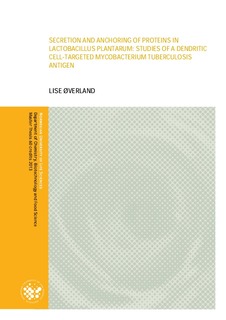| dc.contributor.author | Øverland, Lise | |
| dc.date.accessioned | 2013-08-30T10:48:56Z | |
| dc.date.available | 2013-08-30T10:48:56Z | |
| dc.date.copyright | 2013 | |
| dc.date.issued | 2013-08-30 | |
| dc.identifier.uri | http://hdl.handle.net/11250/186522 | |
| dc.description.abstract | The work described in this thesis is part of a larger project where the goal is to develop oral vaccines based on lactic acid bacteria (LAB). LAB have been used in food for centuries, are a natural inhabitant of the gastrointestinal (GI) tract of humans and are generally recognized as safe (GRAS). These characteristics make LAB attractive candidates for use as delivery vectors of therapeutic proteins to mucosal sites. The ability of Lactobacillus plantarum to persist in the GI tract of humans for up to a week together with its resistance to bile and low pH makes it well suited as an oral delivery vector. Dendritic cells (DC) are major contributors to the initiation of an immune response and it has previously been shown that targeting oral vaccines to DCs may enhance the subsequent immune response. This thesis describes studies on the use of L. plantarum as a live delivery vector for a Mycobacterium tuberculosis antigen fused with a DC binding peptide (DC-pep).
Vectors for secretion, cell wall anchoring and membrane anchoring of Ag85B-ESAT6 fused with a DC-pep were constructed. Secretion and surface display of this antigen in L. plantarum was successfully accomplished with the efficiency seemingly unaffected by the DC-pep fusion. However, correct anchoring of the antigen could not be determined with certainty since the secreted version of antigen was also detected on the surface of the cells. Experiments with DCs showed that their internalization of L. plantarum was higher for strains producing antigen with DC-pep than for the corresponding strains without the DC-pep. Further experiments showed that all antigen producing L. plantarum strains as well as the strain harbouring the empty vector (pEV) were able to induce expression of the maturation marker CD83. Mice were immunized with L. plantarum strains producing DC-pep fused Ag85B-ESAT6 and further challenged with BCG. Upon stimulation with antigen, peripheral blood mononuclear cells (PBMCs) isolated from these mice showed elevated production of the cytokines IFN-γ and IL-17A, both of which are pro-inflammatory cytokines; an up-regulation indicates initiation of a correct immune response. In mice which were immunized with strains producing Ag85B-ESAT6 without DC-pep, the PBMCs showed no elevation in the production of these cytokines. This experiment strongly indicates that the DC-pep stimulates the immune response.
In conclusion, the work described in this thesis shows that L. plantarum is able to secrete and possibly anchor DC-pep fused Ag85B-ESAT6. The presence of the DC-pep enhanced the immune response indicating that further development of the constructs described in this study is a promising strategy for developing novel vaccines against M. tuberculosis. | no_NO |
| dc.language.iso | eng | no_NO |
| dc.publisher | Norwegian University of Life Sciences, Ås | |
| dc.subject | Lactic acid bacteria | no_NO |
| dc.subject | Lactobacillus plantarum | no_NO |
| dc.subject | Mycobacterium tuberculosis | no_NO |
| dc.subject | Vaccine | no_NO |
| dc.subject | Dendritic cells | no_NO |
| dc.title | Secretion and anchoring of proteins in Lactobacillus plantarum: Studies of a dendritic cell-targeted Mycobacterium tuberculosis antigen | no_NO |
| dc.type | Master thesis | no_NO |
| dc.subject.nsi | VDP::Technology: 500::Biotechnology: 590 | no_NO |
| dc.source.pagenumber | 124 | no_NO |
